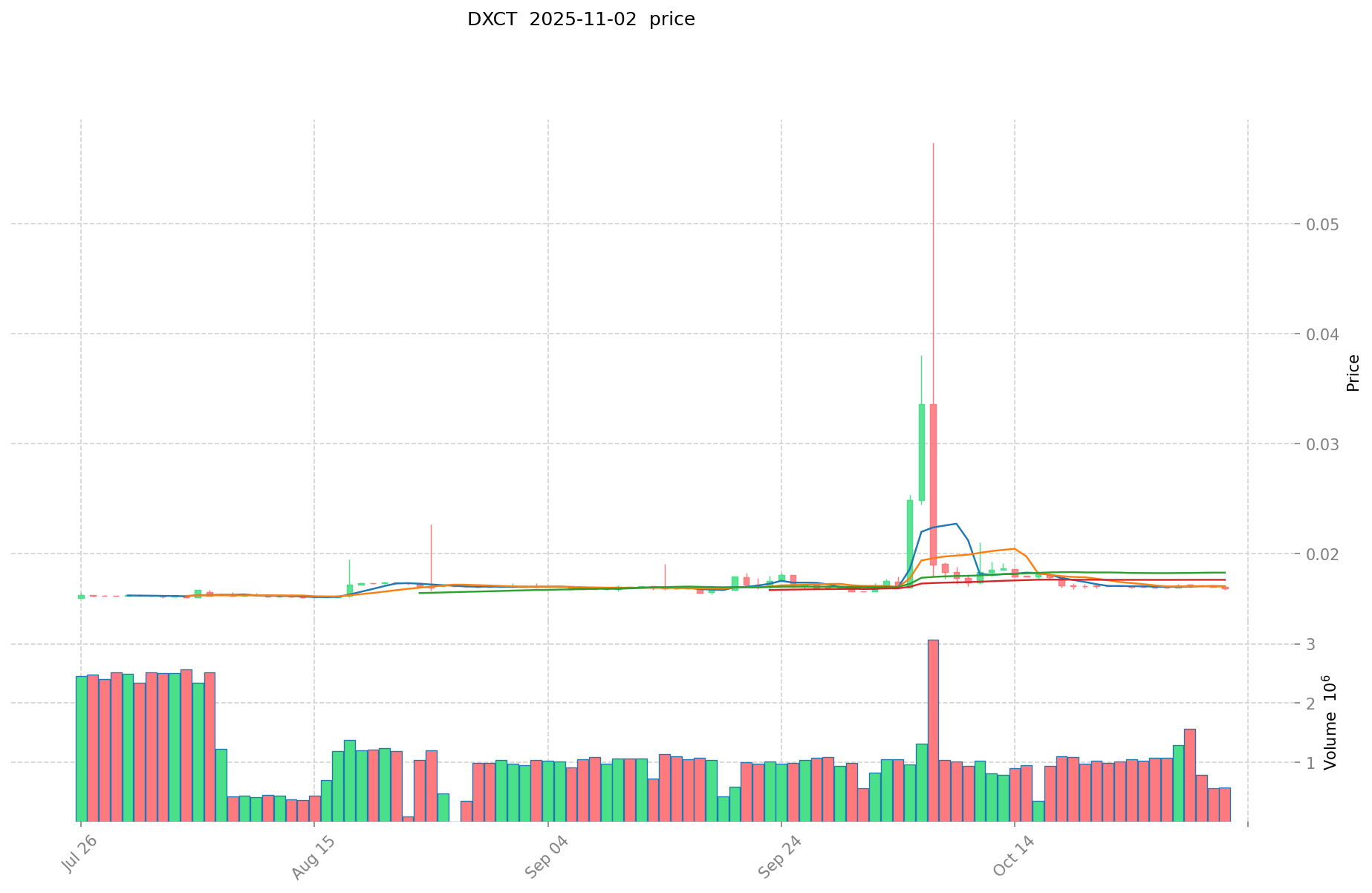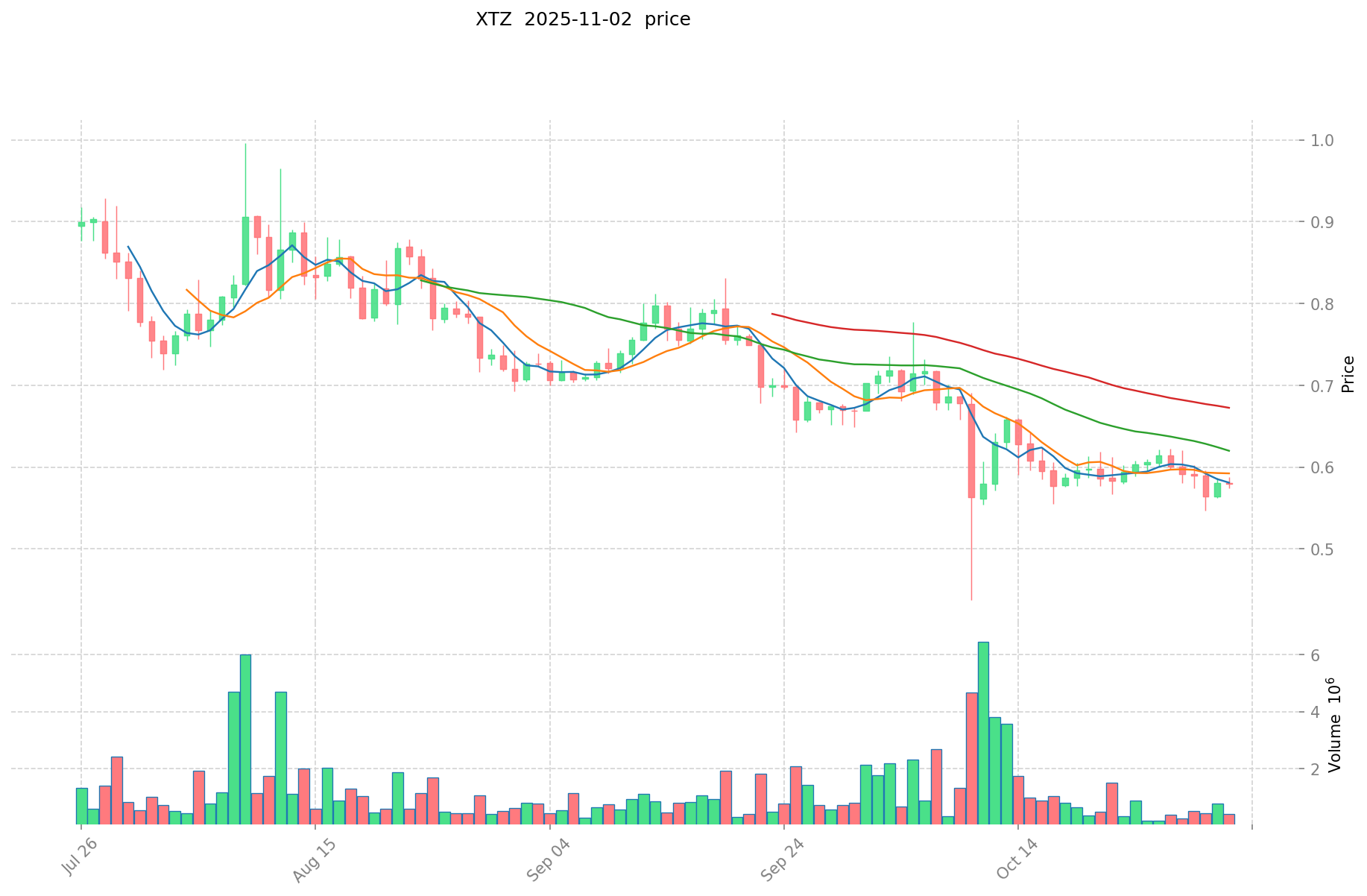DXCT vs XTZ: Comparing Two Emerging Cryptocurrencies in the DeFi Landscape
Introduction: DXCT vs XTZ Investment Comparison
In the cryptocurrency market, the comparison between DNAxCAT (DXCT) vs Tezos (XTZ) has been an unavoidable topic for investors. The two not only show significant differences in market cap ranking, application scenarios, and price performance, but also represent different positioning in the crypto asset space.
DNAxCAT (DXCT): Since its launch in 2021, it has gained market recognition for its digital cat pet world and metaverse concept.
Tezos (XTZ): Introduced in 2017, it has been hailed as a self-evolving blockchain platform, and is one of the cryptocurrencies with significant global trading volume and market capitalization.
This article will comprehensively analyze the investment value comparison between DXCT and XTZ, focusing on historical price trends, supply mechanisms, institutional adoption, technological ecosystems, and future predictions, attempting to answer the question most concerning to investors:
"Which is the better buy right now?"
I. Price History Comparison and Current Market Status
DXCT and XTZ Historical Price Trends
- 2021: XTZ reached an all-time high of $9.12 due to bullish market conditions.
- 2025: DXCT's price has been relatively stable, hovering around $0.01686.
- Comparative analysis: During the current market cycle, XTZ has fallen from its peak of $9.12 to $0.579, while DXCT has maintained a more stable price range.
Current Market Situation (2025-11-02)
- DXCT current price: $0.01686
- XTZ current price: $0.579
- 24-hour trading volume: DXCT $10,197.14 vs XTZ $321,373.44
- Market Sentiment Index (Fear & Greed Index): 33 (Fear)
Click to view real-time prices:
- View DXCT current price Market Price
- View XTZ current price Market Price


II. Core Factors Affecting DXCT vs XTZ Investment Value
Supply Mechanism Comparison (Tokenomics)
- DXCT: Functions primarily as a digital currency and value storage tool
- XTZ: Based on Ethereum's smart contract functionality
- 📌 Historical Pattern: Supply mechanisms drive price cycle changes depending on market demand and network stability.
Institutional Adoption and Market Applications
- Institutional Holdings: Investment value depends on market demand for each token's unique features
- Enterprise Adoption: DXCT relies on its unique decentralized applications, while XTZ leverages Ethereum-based smart contract functionality
- Regulatory Attitudes: Regulatory environments impact both tokens' investment potential across different jurisdictions
Technical Development and Ecosystem Building
- DXCT Technical Development: Value tied to its decentralized applications
- XTZ Technical Development: Based on Ethereum's smart contract capabilities
- Ecosystem Comparison: Different core objectives and technical structures, with DXCT positioned as a digital currency and value storage tool, while XTZ operates within a platform supporting smart contracts and decentralized applications
Macroeconomic Factors and Market Cycles
- Performance in Inflationary Environments: Investment value affected by technical developments and network stability
- Monetary Policy Impact: Investors should monitor market trends and technical updates for both tokens
- Geopolitical Factors: Cross-border transaction demands may affect adoption rates
III. 2025-2030 Price Prediction: DXCT vs XTZ
Short-term Prediction (2025)
- DXCT: Conservative $0.015174 - $0.01686 | Optimistic $0.01686 - $0.0183774
- XTZ: Conservative $0.335646 - $0.5787 | Optimistic $0.5787 - $0.63657
Mid-term Prediction (2027)
- DXCT may enter a growth phase, with prices expected to range from $0.01583568756 to $0.01979460945
- XTZ may enter a consolidation phase, with prices expected to range from $0.400309938 to $0.695620548
- Key drivers: Institutional capital inflow, ETF, ecosystem development
Long-term Prediction (2030)
- DXCT: Base scenario $0.024661856481136 - $0.035266454768025 | Optimistic scenario $0.035266454768025+
- XTZ: Base scenario $0.843564601152 - $1.07132704346304 | Optimistic scenario $1.07132704346304+
Disclaimer
DXCT:
| 年份 | 预测最高价 | 预测平均价格 | 预测最低价 | 涨跌幅 |
|---|---|---|---|---|
| 2025 | 0.0183774 | 0.01686 | 0.015174 | 0 |
| 2026 | 0.020085318 | 0.0176187 | 0.013918773 | 4 |
| 2027 | 0.01979460945 | 0.018852009 | 0.01583568756 | 11 |
| 2028 | 0.02531353508475 | 0.019323309225 | 0.01642481284125 | 14 |
| 2029 | 0.027005290807398 | 0.022318422154875 | 0.016738816616156 | 32 |
| 2030 | 0.035266454768025 | 0.024661856481136 | 0.019236248055286 | 46 |
XTZ:
| 年份 | 预测最高价 | 预测平均价格 | 预测最低价 | 涨跌幅 |
|---|---|---|---|---|
| 2025 | 0.63657 | 0.5787 | 0.335646 | 0 |
| 2026 | 0.7048566 | 0.607635 | 0.5347188 | 4 |
| 2027 | 0.695620548 | 0.6562458 | 0.400309938 | 13 |
| 2028 | 0.73000782792 | 0.675933174 | 0.56102453442 | 16 |
| 2029 | 0.984158701344 | 0.70297050096 | 0.562376400768 | 21 |
| 2030 | 1.07132704346304 | 0.843564601152 | 0.72546555699072 | 45 |
IV. Investment Strategy Comparison: DXCT vs XTZ
Long-term vs Short-term Investment Strategies
- DXCT: Suitable for investors focused on digital currency and value storage potential
- XTZ: Suitable for investors interested in smart contract functionality and ecosystem development
Risk Management and Asset Allocation
- Conservative investors: DXCT: 30% vs XTZ: 70%
- Aggressive investors: DXCT: 60% vs XTZ: 40%
- Hedging tools: Stablecoin allocation, options, cross-currency portfolios
V. Potential Risk Comparison
Market Risk
- DXCT: Volatility due to lower trading volume and market cap
- XTZ: Susceptibility to broader crypto market trends
Technical Risk
- DXCT: Scalability, network stability
- XTZ: Smart contract vulnerabilities, network upgrades
Regulatory Risk
- Global regulatory policies may have differing impacts on both tokens
VI. Conclusion: Which Is the Better Buy?
📌 Investment Value Summary:
- DXCT advantages: Stable price performance, potential in digital currency and value storage
- XTZ advantages: Established ecosystem, smart contract functionality, higher liquidity
✅ Investment Advice:
- Novice investors: Consider a balanced approach, leaning towards XTZ for its established market presence
- Experienced investors: Evaluate both based on risk tolerance and portfolio diversification needs
- Institutional investors: Assess both tokens' potential roles in broader crypto asset strategies
⚠️ Risk Warning: Cryptocurrency markets are highly volatile. This article does not constitute investment advice. None
VII. FAQ
Q1: What are the main differences between DXCT and XTZ? A: DXCT functions primarily as a digital currency and value storage tool, while XTZ is based on Ethereum's smart contract functionality. DXCT is focused on its digital cat pet world and metaverse concept, while XTZ is known as a self-evolving blockchain platform.
Q2: Which token has shown better price stability? A: Based on the provided information, DXCT has maintained a more stable price range, hovering around $0.01686 in 2025. XTZ, on the other hand, has experienced more volatility, falling from its all-time high of $9.12 to $0.579.
Q3: How do the market caps and trading volumes of DXCT and XTZ compare? A: As of 2025-11-02, XTZ has a significantly higher 24-hour trading volume at $321,373.44 compared to DXCT's $10,197.14. This suggests that XTZ has higher liquidity and market activity.
Q4: What are the key factors affecting the investment value of DXCT and XTZ? A: Key factors include supply mechanisms, institutional adoption, technical development, ecosystem building, and macroeconomic factors such as inflation and monetary policy.
Q5: What are the long-term price predictions for DXCT and XTZ? A: By 2030, DXCT is predicted to range from $0.024661856481136 to $0.035266454768025 in the base scenario, while XTZ is expected to range from $0.843564601152 to $1.07132704346304 in the base scenario.
Q6: How should investors allocate their assets between DXCT and XTZ? A: Conservative investors might consider allocating 30% to DXCT and 70% to XTZ, while aggressive investors might opt for 60% DXCT and 40% XTZ. However, individual allocations should be based on personal risk tolerance and investment goals.
Q7: What are the main risks associated with investing in DXCT and XTZ? A: Both tokens face market risks, technical risks, and regulatory risks. DXCT may be more volatile due to lower trading volume, while XTZ faces risks related to smart contract vulnerabilities and network upgrades. Both are subject to evolving global regulatory policies.
Q8: Which token might be more suitable for novice investors? A: Based on the provided information, novice investors might consider leaning towards XTZ due to its more established market presence and higher liquidity. However, a balanced approach considering both tokens could also be appropriate depending on individual investment goals and risk tolerance.
Share
Content